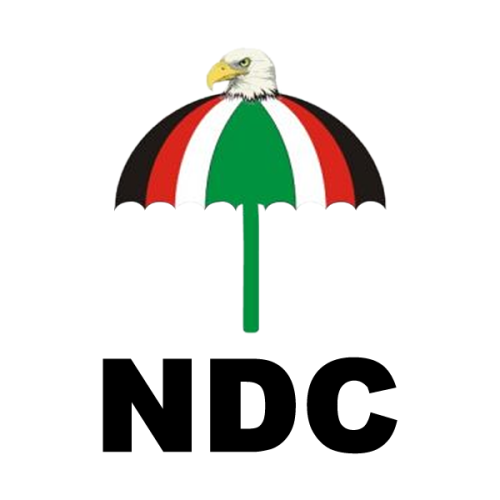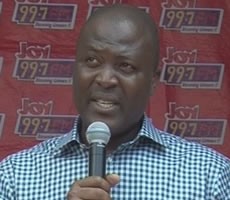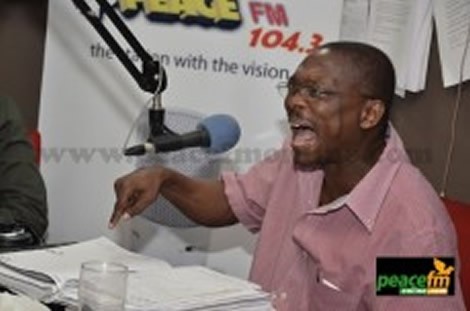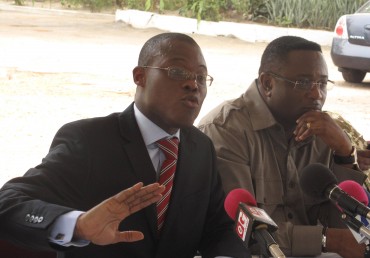By Kofi Bentil
Imani has analysed the proposals from the NPP regarding Free Secondary
Education, and concluded that, as the proposal is now, it is not
appropriate to deliver what Ghana’s education system requires, indeed
it is likely to create more problems than it will solve.
The figures put out by the NPP are also not accurate, and the whole
idea, attractive as it may seem may overwhelm our education management
system which is already stressed.
We believe there are clear problems with the education system and it
is not difficult to tell that Free education will not deal with them.
A focus on the real problems and a closer look at the alternatives
will reveal better options which indeed will cost less and achieve
more.
Most of our people may not take the time to do the real analysis of
such a proposal so it is easy to get people to accept a promise of
free education without considering the real effect such a policy can
have, but Leaders must do the hard work and tell everyone exactly how
the considerable resources to be expended will solve the problems with
our education system.
Education is crucial to everything so it is understandable that is a
lot of emotion around this matter, but we urge a cool calm
consideration of the issues and a reasoned conclusion on which
alternative is best for mother Ghana. If we get this wrong we could
seriously derail our country on various levels economically socially
etc. education is not just important, it is everything.
It is important to state at this point that contrary to the news
headlines which the media adopted i.e. IMANI SAYS GHANA DOES NOT NEED
FREE EDUCATION, IMANI IS NOT AGAINST FREE EDUCATION PER SE, indeed our
position is that we will be paying either directly or through Taxes,
so it is not really free, furthermore, we will embrace any policy
which would solve the problems, and expose any policy which would
spend tax funds and not solve the problems.
What we are debating is not the importance of education, it is
important to state that REGARDLESS OF HOW MUCH IT COSTS we will
support ANY policy which solves the problems of education because IF
WE SOLVE THE PROBLEMS WITH EDUCATION WE WILL MAKE UP ANY AMOUNT SPENT
ON IT! Nothing is too expensive for education. Education is not on
trial, it is a specific policy which we are interrogating.
We also have to state that We have no doubt as to the good intentions
of the NPP. It is a noble thing to even dream such audacious dreams
about education, but we must also know that good intentions do not
automatically lead to good ideas and implementation. The intention may
be excellent, but the ideas and strategy on how to arrive at the
solution may be wrong and even if they are right they could be
implemented wrongly. This is why many leaders across the world have
failed although they wished their people well and were determined to
implement their dreams, many examples abound about how leaders have
had great dreams which went wrong and left their countries backward
and suffering. We need to learn and avoid problems we can avoid.
To clarify the issues, we need to state clearly what we are dealing with
1. NPP intends to make secondary school education free, i.e. no one
will pay fees for going to SSS. (tuition, B&L)
2. As part of the program, BECE will be abolished and JSS students
will automatically move to SSS. (what selection criteria? Lottery,
what about academic merit? A bloom in corruption “special random” the
current system is fair)
We also have to be clear that all these efforts are aimed at solving
the problems in our education system, fortunately these problems are
not hard to define and obvious to many, if an idea is likely to solve
the problem it wont take great analysis to know, and if it cannot, it
would not take a lot of analysis to tell. These make it easy for the
average person to understand the basis of our position.
The problems in our education system (specifically SHS) are as follows:
1. The poor don’t get access to the best SHS because they are not able
to pay for good JHS which will enable them to pass well and beat the
competition for spaces at SHS. Those who pass JHS well get admission,
then the problem of money arises.
2. There is a shortage of high quality SHSs across the country. The
best schools are collected in few areas and have limited capacity.
3. The poor have a problem paying for SHS even when they get admission
and help from the scholarship system which is designed to help them is
not forthcoming because the scholarship secretariat has lost its way,
and become so opaque in its dealings, hardly anyone knows how it
works, and how to get help from it even if you qualify for help.
These are some of the key problems affecting the SHS system only. The
problems of education stretch beyond SHS but affect it, solving SHS
alone wont solve the whole education problem, a holistic view is
required to ensure that:
a. Children enter school at the right age, and stay in school until
the right time for leaving
b. Children get good quality teaching and learning all through school
at every stage
c. Children do not drop-out but can exit at particular points to
branch into the tertiary systems whether to continue on an academic
path or to enter the trades and other professions
d. Regardless of how they terminate, our people have access to go back
to acquire further knowledge if they desire
The are solutions to these problems, they will all cost money, but
money is the easier part, these problems will require serious
strategizing and then the money applied would yield the right results.
We must admit that we have had a history of tinkering with education
and in the name of reforms we have uprooted our education system many
times since Kwame Nkrumah, each time the verdict is that the new
system is worse than the one just uprooted. This is because not enough
strategy goes into these ‘reforms’ they are based in the emotions and
ideologies of the current leader(s) and technocrats just follow on in
a servile manner without much question.
We have learnt our lessons, or so we hope. This is why we are speaking
up on this issue, to ensure we don’t go the same way.
The problems as listed above are prevalent in many countries and
things have been tried with varying degrees of success both in Ghana
and elsewhere, the evidence from the past attempts are as follows.
This applies to Ghana as well.
Studies from many African and developing countries in Asia[1] and even
developed nations, Free education programs have usually lead to a
destruction of quality, and emergence of a private school sector, a
hardening of the vicious cycles which keep the rich and poor education
systems apart and reinforce the socio-economic status quo, in effect
defeating the upward social mobility education it best suited to
provide.
The Free public system quickly degenrates into a farce, facilities
crumble, good teachers leave, everything reduces to a bare minimum
quality and officials just go through the motions to keep up a
semblance of a system which enables them continue to draw funding,
which is usually corruptly siphoned off. The effect is that people
(rich and poor) pay to avoid this system, they find private schools
which quickly emerge and are usually expensive, and pay to give their
children the best education they can afford. This has the terrible
effect of condemning the poorest to the bad system whilst the rich and
resourceful get out and pay for better education which in turn
perpetuates the cycle of poverty and affluence, where the rich kids
get to go on to the better Secondary schools (which ironically in
Ghana are public and subvented) whilst the poor just drop out, or end
up in low quality Secondary schools leaving them even more
disadvantaged educationally, and thus affects their university
admission and job prospects.
FREE DOESN’T ALWAYS LEAD TO GOOD EDUCATION FOR THE POOR!, if one looks
at the so called “Syto” system in Ghana, this situation is easily
identified.
In other countries the same phenomenon has been identified, in his
book ‘The Beautiful Tree’ James Tooley documented this phenomenon in a
number of developing countries. In a recent article the Economist
Magazine has catalogued how Poor people do everything they can to
avoid public schools, and in the process end up paying private persons
outside the public system to provide education, which ironically
yields better passes than the better funded public system with its
trained teachers and all. In effect Government is spending money for a
certain target (the poor) who are running away from the system because
it doesn’t work as well as the government and politicians want us to
believe.
On a matter such as Education, opinions will and should differ, but
there are things we all can agree on, to be safe we will stick to the
things we agree on and provide alternatives which hopefully are
obvious.
Our current problems with the education sector
1. Patchy Quality And Quantity. With A More Serious Problem Of Quality
2. Economic Or Social Status Tends To Determine Access To Quality Institutions.
3. Inefficiency In Administration Of Resources Towards This Sector
STRATEGY
The above problems have persisted regardless of strenuous efforts over
the years directly aimed at solving them. We should be clear what we
are looking to achieve and examine why we are where we are, and
hopefully make the right choices which have the chance to deal with
these problems once and for all.
These are the things we all want for our Education system:
1. Sufficient quality and quantity..
2. Universal access to all citizens, regardless of economic or social status
3. Sustained efficiency in administration of resources towards this sector
Over the years of trying, a few things are obvious to all persons
involved in education planning, management, policy analysis, and
administration. Such as
1. throwing money at the problem doesn’t mean it will go away
2. free secondary education will bring another layer of administrative
complexity with managing the funds, the increased demand and quality
assurance.
Another set of issues which may not be obvious but are true are that:
1. not everyone is asking for free education, indeed NO ONE we know is
asking for free education, just access to good quality affordable
education
Question is, with 50 years of such experiences, in the face of the
facts that the current proposal for free education does not include a
redesign of a different system, what makes us believe that this free
education policy would be different? We need to see what strategy will
be adopted to avoid the usual outcome of waste and failure!
What Constitutes Free Education?
There are many items which are paid for in secondary school, we don’t
expect government’s free education to pay for all of these for example
transportation to and from school, so we have reduced the list to
represent about 85% of the total cost, so parents will still bear 15%.
The items to be paid for are:
a. Tuition
b. School and Registration Fees
c. Food Board & Lodging (boarders)
d. Books and school supplies
Some enrolment statistics are as follows:
1. From Primary to JHS 67% go through 33% drop off, its free, so the
drop off is not due to money.
2. From JHS 3 to SHS1, only 37%% go through, 63% drop off, this is due
to many reasons including money and academic failure.
3. With Free Education (i.e. money removed as a problem) we expect the
same transition rates as Primary to JHS i.e. 67%.g
ABOLISHING BECE
There is the other issue of abolishing BECE. There is the need to
clarify this matter, how will secondary schools select students who
qualify. The stated policy is that JHS should no longer be a terminal
point, students must have an automatic continuance till SHS. The logic
is that if the policy is seeking to pass all students through the
education system till the end of SHS, then
1. there will be no need for BECE and a computerized selection system
to place students in SHS
2. SHS will have use other mechanisms to select students because they
cannot absorb all applications, this is especially true for the higher
quality (grade A and B) schools
3. There are fewer SHS spaces that JHS graduates so space will have to
be found for the extra students
This raises again the questions of quantity and quality, lets deal
with quantity first
The quality question is also raised, how do you justify a system which
chooses under 500 students from over 10,000 applications (as happens
in all Grade A SHSs today), when there is no merit based selection
process like the BECE, for example how is Presec or Wesley Girls
supposed to select their students.
We have heard someone (NUGs) say that the students should be placed
regardless of their capabilities and then will we see what the real
quality of the Grade A schools are, when they are able to take not so
good students and make them into high performers. Well our view is
that this approach will just destroy our Grade A schools. Every
country has its ‘IVY LEAGUE’, and this is crucial for its development,
since societies modernized, smart nations have found a way to select
the best of its people and train them to achieve the great things
which such people are capable of nobody is making the argument that
our grade A schools work magic with average students! All great
schools have a strict admissions process which allow only those with
potential to excel in. asking our good schools to take people who
could not excel at JHS and convert them to high performers is simply
destroying the best we have and that is not smart!!
History has also taught us that whenever selection is not merit based
the rich and powerful end up rigging the system to the detriment of
the poor and weak, for example imagine that Wesley girls and Presec
have to choose 1000 students from a pool of 10,000, we are very sure
that only the rich and powerful will get those spaces, those of us
without connections or wealth will never make it! This is what free
education designed to help the poor usually ends up in, a destruction
of quality and an unfair system favouring the rich and powerful.
Let me contrast that with the system we want to change, today if a
poor child passes JHS well, just by merit regardless of their economic
status they will get admission to Wesley Girls! This is because Wesley
girls selects the overwhelming number of its students each year on
merit alone!! And the evidence is placed on a board for all to see, so
if a child who didn’t do well is selected, her grades will be clearly
displayed and all will see that something is amiss. This removed the
power of the rich and powerful and favours the poor because it is
merit based!!
Now comes the problem of money, assuming the poor child gets
admission, and cannot pay the fees, (which usually is lower than the
fees paid in good JHS schools) the Government Scholarship secretariat
is there to help such people, what is going on at the scholarship
secretariat today?
We have found that regardless of economic status if a child gets
admission to a grade A school, whole families rally around and
mobilize to pay for the child to stay in school. We believe these are
the people free education money should go to help not the 80% plus of
students (who get admission to grade A schools) whose parents can
easily afford to pay the subsidized fees being charged today!!
The simple point on this is that the proposed Free education will rip
out the current system and replace it with an inferior one which
favours the rich and powerful.
We propose that if we can find money for free education then we must
use that money to support students who get admission but cannot pay
(about 30% to 50%) through the scholarship secretariat. Fixing the
scholarship secretariat and providing money to even 50% of students
will be cheaper and easier than scrapping the merit based admission
system and paying fees for all students regardless of their economic
status!.
It is a fact that not all Ghanaians are poor and unable to pay for
their children’s education, indeed many families consider it a
fundamental responsibility which they are proud to bear even if they
struggle to do so, it is a source of great pride to every parent to
say they worked and paid for their child’s education, so most people
will gladly pay if they have the means. This means not everyone is
asking for or would even accept the offer of free education, on the
contrary everyone we have spoken to on this matter expressed great
concern for quality education, if only they had access to high quality
education they would work out a way to pay for it, the problem is
getting space at a grad A school, which is more a matter of quantity
of quality schools, more than the cost of quality schools.
In a situation as this, if seems the right thing to do to have those
who can pay, pay! and we use the scarce resources to build more high
quality schools to provide more spaces. It will require that we
identify those who cannot pay through a system which is already in
place – the scholarships secretariat and help them to pay, applying
the funds this way is clearly cheaper (we pay for 50% not 100%) and
more effective (it really helps the poor) and preserves, indeed
increases quality (by preserving the merit based system and building
more high quality schools).
Then the problem of getting access to the high quality schools could
be tackled as follows:
the inability to pay and attend high quality JHS is the reason why
poor students fail and cannot get access (on merit) to high grade
schools. If we want to help the poor and level the playing field for
access to SHS, The scholarship system should identify students going
into JHS and help them pay for high quality JHS, this way they get to
pass well and get admission to god SHS.
Again this is better than spending the money to pay for SHS for people
who fail or get bad tuition in JHS, regardless of how free SHS is it
cannot solve the problem of illiteracy and weaknesses in basic
numeracy and problem solving!, if a student cant read (as was reported
recently in the northern region where all school is free) there is
little SHS can do for that person!, indeed we are better spending the
money to ensure that JHS is successful, before we can purport to pay
for SHS, Free education at SHS doesn’t solve the real problem.
It is easy to conclude after all our work that:
WHAT WE REALLY WANT IS HIGH QUALITY EDUCATION WHICH IS ACCESSIBLE TO
ALL GHANAIANS REGARDLESS OF THEIR ECONOMIC STATUS!!
THIS MAY NOT BE DELIVERED BY FREE EDUCATION!!
INDEED THE REVERSE MAY HAPPEN IF WE IMPLEMENT THIS FREE IDEA!
The big challenge is having a top class (JHS and SHS) school in each
region, accessible to everyone by merit regardless of their social or
economic status, this can be done with this money earmarked for free
education.
PROPOSALS :
· Why not reconfigure the entire government scholarship scheme to
reflect our national education needs. It is too opaque and there are
suspicions of serious corruption and moral turpitude affecting the
scheme, it need ‘sunshine’ the best disinfectant. if we are prepared
to have free education at SHS, we must be prepared to deal with one
institution!
· Why not use the money to build one high quality schools in each
region, ($50m will build a SHS with all the facilities of Mfantsipim),
so we can have 10 over 4 years at a cost less than the bill for FREE
SHS.
· Why not provide access to these schools for everyone regardless of
economic statusU
IF WE ARE GOING AHEAD WITH FREE SHS AS ANNOUNCED, we need the policy
makers and politicians to tell us the following:
HOW DO WE
1. Guard against the threat of a reduction in quality over time
2. Prevent or manage The huge growth in demand for secondary education
especially boarding schools (which is a good thing).
3. Manage the administrative system needed to manage this scheme into
the future and prevent serious corruption and mismanagement. (which is
the real problem and would not be dealt with by just making SHS free)
Conclusion
We do not have infinite resources, even if we did, we should not do
things which clearly will waste money and not achieve their goals,
even if they are politically attractive. We as civil society have a
responsibility to go behind and bring up the real issues, so together
we can find a way to bring what we all want to fruition. This includes
revealing what will not.
It is true that we can find the money, but if we have money, it
doesn’t mean we should apply it anyhow, no waste is justifiable!
Kofi Bentil.







